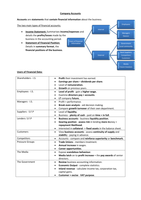Class notes
Company Accounts (1)
- Course
- Institution
A look at the income statement and statement of financial position with diagrams and examples. User of Financial Data both internal and external. How to calculate gross profit, cost of sales and net profit. How to evaluate an income statement. The assets and liabilities of a company.
[Show more]



